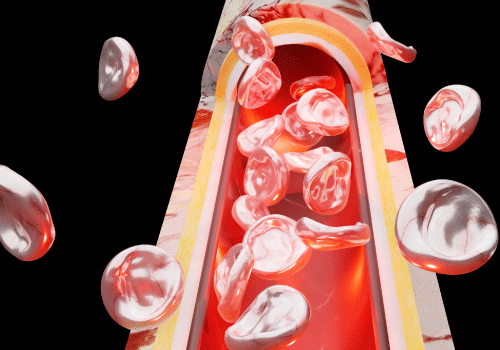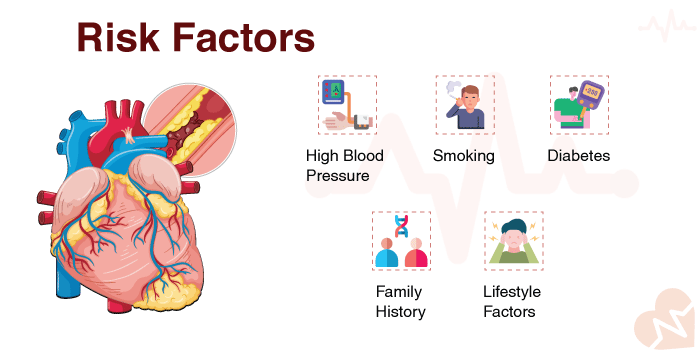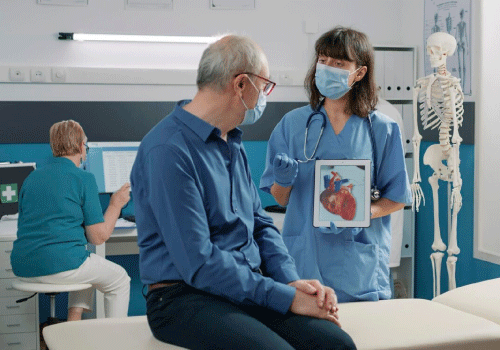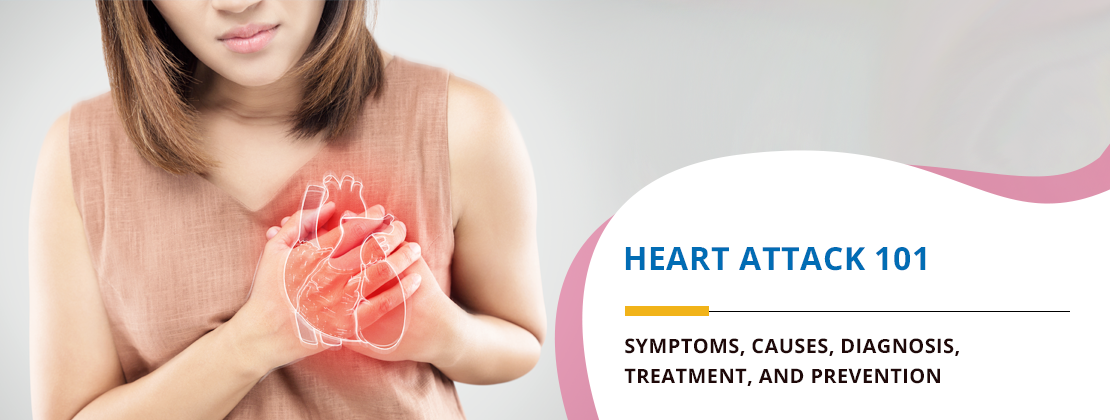Introduction
Heart attacks, medically known as myocardial infarctions, are one of the leading causes of death worldwide. Heart attack symptoms, heart attack causes, and treatment options are important aspects to be aware of for early intervention and improved outcomes.
This blog provides an understanding of heart attack symptoms, learning about heart attack diagnostic procedures, exploring heart attack treatment options, and adopting heart attack preventive measures to safeguard your heart health.
What is a Heart Attack?
A heart attack occurs when blood flow to a section of the heart muscle is severely reduced or blocked, usually due to a blockage in the coronary arteries. The most common cause of this obstruction is atherosclerosis, which is characterised by an accumulation of fat or plaque in the arteries. These arteries can sometimes break down, causing blood clots, and can block blood flow completely.
Understanding these mechanisms is important for effective heart attack prevention. Knowing how lifestyle factors, genetics, and pre-existing conditions contribute to heart disease can lead individuals to take proactive measures to reduce risk.
Common Causes of a Heart Attack

Atherosclerosis
Atherosclerosis is the underlying cause of most heart attacks. In this condition, cholesterol builds up in the arteries, causing them to narrow over time. Decreased blood flow makes arteries more likely to block completely.
Blood Clots
When a plaque breaks down in a coronary artery, it can cause bleeding. This blood clot can block blood flow to the heart muscle, leading to a heart attack. Early identification of risk factors such as hyperlipidaemia can help prevent this outcome.
Other Risk Factors

- High Blood Pressure: Persistent high blood pressure weakens the walls of arteries, which can make them more likely to get damaged and develop blockages.
- Smoking: The use of tobacco speeds up the accumulation of plaque and harms the linings of arteries, which raises the risk of clots.
- Diabetes: High levels of sugar in the blood harm coronary arteries and encourage atherosclerosis.
- Family History: A genetic predisposition to heart disease significantly raises the likelihood of experiencing a heart attack.
- Lifestyle Factors: Poor diet, lack of exercise, and chronic stress are major causes of heart disease. The risk can be greatly reduced by adopting healthy habits.
Additional Reading: How to Beat Heart Attack Risks: Expert Advice from HCG’s Cardiologists
Recognising the Symptoms of a Heart Attack

Common Symptoms
- Chest pain or discomfort: This may feel like pressure or squeezing in the centre or left side of your chest.
- Pain in the Upper Body: You might feel pain that radiates from your chest to your arms, neck, jaw, back, or shoulders.
- Shortness of Breath: Having trouble breathing, especially while resting or doing something light like walking a short distance.
- Cold Sweat: If you start sweating for no reason and feel anxious at the same time.
- Nausea and Dizziness: A feeling of lightheadedness or upset stomach.
Gender Differences
Heart attack symptoms generally differ between men and women. While men tend to experience classic symptoms such as chest pain, sweating, and jaw pain, women may experience more subtle symptoms such as back pain in addition . Identifying these differences is important for the effective management of the condition.
When to Seek Help
If you or someone else experiences these heart attack symptoms, especially if they last longer than a few minutes, seek medical attention immediately.
Diagnosing a Heart Attack
Initial Evaluation
The first steps in the diagnosis of a heart attack are a thorough physical examination and a detailed assessment of the patient history. Understanding pre-existing health conditions, symptoms, and lifestyle factors helps doctors assess risk and severity.
Diagnostic Tests
- ECG (Electrocardiogram): Identifies irregular heart rhythms and electric patterns linked to heart attacks.
- Blood Tests: Check for cardiac enzymes in the blood that show if the heart muscle has been damaged.
- Imaging Tests: Procedures such as echocardiograms or coronary angiograms (CT-Coronary/Conventional Coronary Angiograms) can help doctors see blockages and assess blood flow.
- Stress Tests: These tests evaluate how the heart performs under physical or chemical stress, revealing potential underlying issues.
Accurate heart attack diagnosis ensures appropriate treatment and reduces the risk of complications.
Treatment for a Heart Attack

Immediate Treatment
- Medications: Doctors might give clot-busting drugs (thrombolytics), antiplatelets, and beta-blockers to stabilise the condition and restore blood flow.
- Angioplasty and Stenting: This is a type of minimally invasive surgery that uses a balloon to open up the artery and places a small mesh tube called a stent to help it stay open.
- Bypass Surgery: In severe cases, the person may need heart bypass surgery. This operation involves creating new pathways for blood to flow around the narrowed or blocked arteries; it could be MICS or standard surgery (sternotomy)
Additional Reading:Leading Heart Care Treatments at HCG Hospitals
Post-Heart Attack Treatment
- Cardiac Rehabilitation: A comprehensive program that includes supervised physical activity, advice on healthy eating, and emotional support to help recovery.
- Long-term medications: These consist of antiplatelets, statins, and other anti-hypertensive drugs/anti-anginal drugs. They are used to control risk factors and ward off further attacks.
Early and effective heart attack treatment improves survival rates and enhances quality of life.
Preventing a Heart Attack
Lifestyle Changes
- Healthy Diet: To stay healthy, eat whole grains, lean meats, fruits, and vegetables. Avoid saturated fats, sugars, and processed foods as much as possible.
- Regular Exercise: Get regular exercise like brisk walking or cycling, at least 150 minutes a week.
- Avoid Smoking and Limit Alcohol: It is important to avoid smoking and limit alcohol consumption. If you smoke, quitting is essential.
Managing Health Conditions
- Weight Management: Maintain a healthy weight to reduce the strain on your heart and minimise associated risks.
- Regular Health Checkups: Regular health checkups are also necessary to monitor levels of cholesterol, blood pressure, and sugar; this will help identify potential problems.
Adopting these measures is key to heart attack prevention and overall cardiovascular health.
Conclusion
Recognising heart attack symptoms and understanding their causes is important for timely diagnosis and heart attack treatment. Prevention through lifestyle changes and regular health monitoring remains the best option. If you are experiencing symptoms or have concerns about your heart health, contact the cardiologists at HCG Clinics. With super-speciality hospitals in Ahmedabad, Bhavnagar, Rajkot, and Hubli, we offer world-class cardiology services to help you lead a healthy life.




